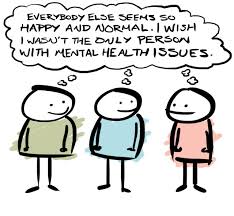I like referring to mental illnesses as mental health challenges. This is because it is more inclusive of people who may not have a diagnosis. It reminds us that there are many related challenges and it offers hope that the challenges can be overcome.
A favorite thing for me to do is talk about what causes mental health challenges and that recovery is very possible because there are many people who have to deal with mental health challenges and they need to know it is not their fault and that there is good reason to be hopeful. For too long, people were blamed and stigmatized because they had a mental health challenge and they were told not to expect very much from life because they had one. Fortunately, in recent years, there has been a lot of good information available on what causes mental health challenges and that recovery is very possible.
Mental health challenges can affect anyone regardless of race, gender, education, religion, age, intelligence or income. They are not the result of personal weakness, lack of character, poor upbringing, or lack of faith. According to the National Institute on Mental Health, mental health challenges appear to be disorders of brain circuits. While there can be a genetic pre-disposition to having a mental health challenge and a mental health challenge can be triggered by stress, illness or trauma, not everyone with a pre-disposition will develop a mental health challenge. This is because we are all unique individuals.
According to National Alliance on Mental Illness (NAMI), recovery is not only possible but probable for people because, with a combination of pharmacological and psychosocial treatments and support, 70 – 90% of people with a serious mental illness have significant reduction of symptoms and improved quality of life, . The key to recovery is having hope. Hope is the key to getting better because, without hope, a person will give up and not try anything that can make their life better. The most important thing you can do for yourself or someone you care about is have hope that they can get better even when they cannot believe it for themselves. Have hope even when recovery seems hopeless because, according to the National Empowerment Center, a person can recover from a mental health challenge regardless of what disorder they have, when it began or how long they have had it.
Most adults who have a mental health challenge do not seek help because they fear being devalued, stigmatized, isolated, ignored and discriminated against if it is known that they have a mental health challenge. This is unfortunate because often medication and support are needed, and most people who receive appropriate treatment and support get significantly better. What is even more unfortunate is that, according to a recent study from Baylor University, when people do seek help, “clergy, not mental health professionals, are the most common source of help sought in times of psychological distress” and clergy are ill prepared to provide help. I was ordained, and, in seminary, I learned very little about mental health challenges and even less about recovery. We were simply told to make referrals, but we do not always understand the local mental health system and know to where to make a referral.
If you or someone you care about is trying to deal with a mental health challenge, get help from a mental health professional. Don’t wait, hoping it will go away on its down. Be honest with your doctor and ask for a referral to a mental health professional. Recovery is very possible, but it is often dependent on appropriate treatment and support.


